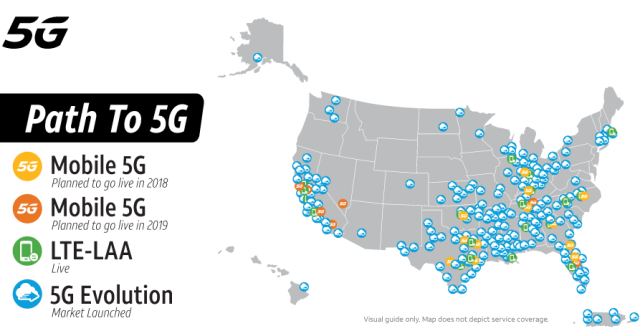US telecom major AT&T, which announced mobile 5G+ network on December 21, today revealed how it will position 5G for its business customers.
 AT&T is yet to disclose the number of retail and enterprise customers who have started using its 5G+ service, which is available free of cost, on a mobile 5G device over a standards-based mobile 5G network.
AT&T is yet to disclose the number of retail and enterprise customers who have started using its 5G+ service, which is available free of cost, on a mobile 5G device over a standards-based mobile 5G network.
AT&T aims to reach America’s 15 million businesses with the 5G services.
Mo Katibeh, CMO of AT&T Business, said: “The 5G services will open up opportunities to increase revenue, reduce operational costs, and ultimately create amazing new experiences for employees and customers.”
Jason Leigh, senior research analyst at IDC, said: “Leveraging the low latency, increased connection density and high bandwidth power of 5G will allow businesses to deploy integrated solutions.”
Mobile 5G
AT&T has already started the deployment of standards-based mobile 5G network across the nation targeting to launch in early 2020 – offering seamless handoffs between Wi-Fi, LTE and 5G.
NETGEAR Nighthawk 5G Mobile Hotspot launched in 2018 and two 5G smartphones from Samsung being launched this year will support AT&T’s Mobile 5G.
AT&T said business customers have started using standards-based mobile 5G network which is live in the parts of the 12 cities.
AT&T’s Foundry in Plano, Texas dedicated to prototyping solutions for industry verticals, will also co-create 5G solutions with its customers.
Fixed Wireless Broadband
Business customers can use the current fixed wireless offering to upgrade to AT&T 5G when it’s available in their area.
AT&T’s Fixed Wireless Broadband will offer multiple speed tiers up to 50Mbps speed. Over 8 million business customer locations sit within 1,000 feet of its fiber, and it connects nearly 2.2 million locations with fiber.
Edge Computing
AT&T Business offers AT&T Multi-access Edge Compute (MEC) solution that uses its own software-defined network to enable faster access to data processing, and gives flexibility in how businesses manage their cellular traffic through on-premise hardware and software.
AT&T MEC can be deployed today using LTE or 5G connectivity, for both mobile and fixed wireless applications.
AT&T recently announced deals with AT&T Stadium, and Rush University Medical Center to set up 5G with a focus on MEC.
“5G will be a turning point in how mobile networks are used in caring for patients. Using multi-access edge compute, the possibility of robotics and increased telehealth are two aspects of healthcare that we’re planning to explore,” said Shafiq Rab, chief information officer, Rush University Medical Center and the Rush System for Health.
